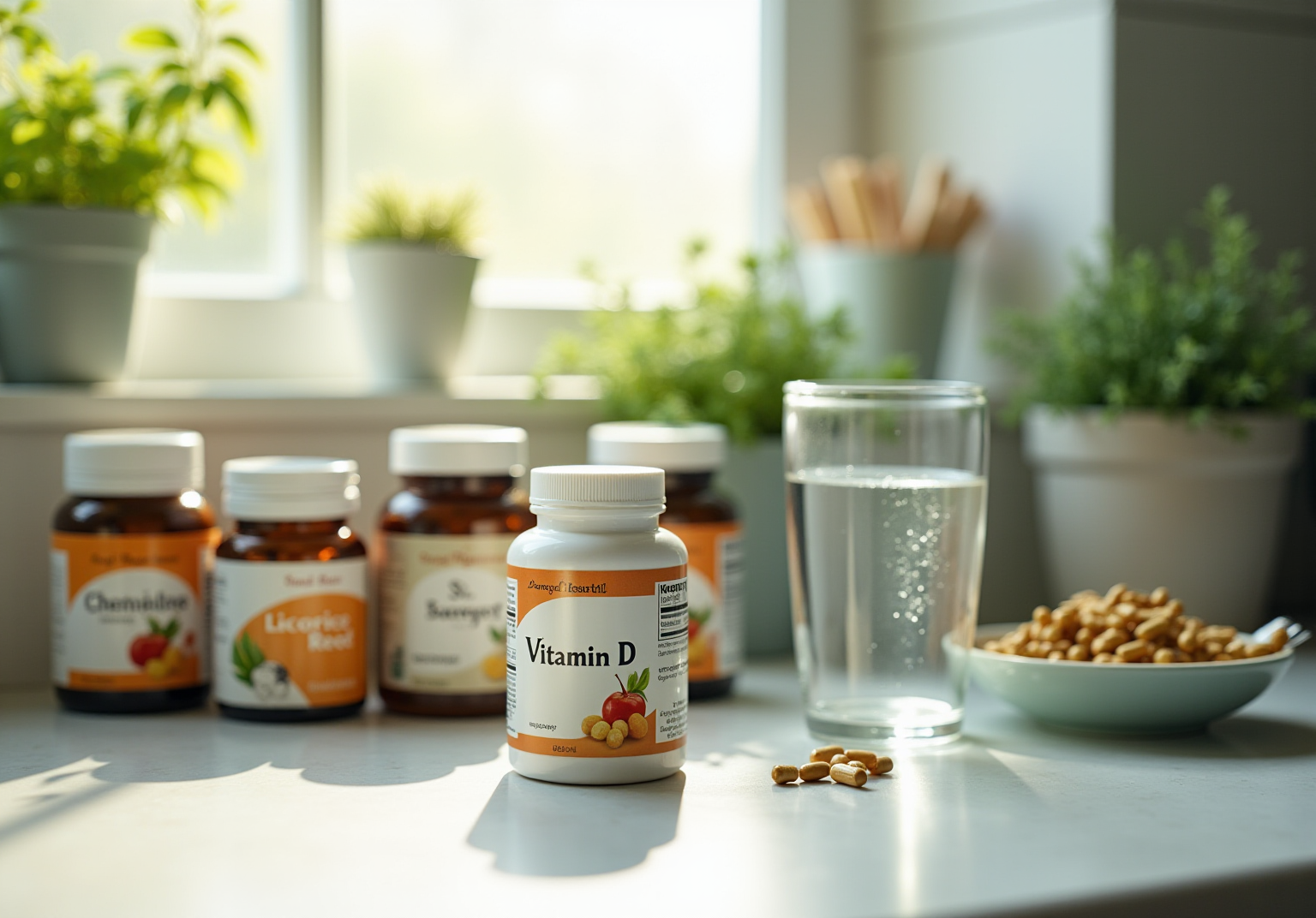


If you or a loved one is managing high blood pressure, it’s important to be aware of certain vitamins and supplements that may not be beneficial. Substances like St. John's wort, licorice root, guarana, and bitter orange can potentially elevate blood pressure or interfere with medications designed to help. This guidance is not just a precaution; it is supported by research and expert opinions that highlight the negative cardiovascular effects these substances can have.
Understanding your health is a journey, and it’s perfectly normal to have questions and concerns. That’s why it’s essential to consult with your healthcare provider before adding any new supplements to your treatment plan for hypertension. They can provide personalized advice tailored to your unique situation, ensuring you feel supported every step of the way.
In addition to this, remember that you are not alone in this process. Many individuals face similar challenges, and reaching out for help can make a significant difference. Your health and well-being are paramount, and taking proactive steps can lead to a more balanced and healthy life.
Understanding the intricate relationship between vitamins and blood pressure is vital for anyone managing hypertension. Many individuals might feel overwhelmed by the information surrounding supplements, often believing they are beneficial. However, it’s essential to recognize that certain vitamins can inadvertently elevate blood pressure or interfere with crucial medications. This article explores specific vitamins to avoid, revealing how they can impact cardiovascular health and medication efficacy.
What if the very supplements intended to enhance your well-being are actually jeopardizing it? This paradox can be concerning, but uncovering it empowers you to make informed choices about your health. It’s important to consult healthcare professionals before integrating new vitamins into your routine. Remember, you are not alone in this journey. Seeking guidance can provide reassurance and support as you navigate your health decisions.
At Amavita Heart and Vascular Health, we understand the concerns surrounding cardiovascular health, especially for our elderly patients. Our skilled geriatric cardiologist emphasizes the essential role vitamins and supplements can play in managing elevated cardiovascular levels. Recent studies suggest that specific vitamins to avoid with high blood pressure can significantly impact cardiovascular well-being, making it crucial for individuals to be aware of them.
Have you ever wondered how certain vitamins might affect your health? Research indicates that certain vitamins to avoid with high blood pressure, such as:
can elevate circulation levels or disrupt antihypertensive medications. For instance, St. John's wort may reduce the effectiveness of hypertension medications by hindering their absorption. Licorice root is among the vitamins to avoid with high blood pressure, as it can lead to elevated sodium levels and decreased potassium levels. Guarana, often found in energy drinks, contains caffeine that may increase circulation levels and heart rate, which is why it is considered one of the vitamins to avoid with high blood pressure when consumed in large quantities. Bitter orange, derived from the fruit or peel, contains p-Synephrine, a stimulant that can elevate circulation and heart rate, which is a concern when considering vitamins to avoid with high blood pressure due to the risk of severe side effects.
A systematic review encompassing 23 studies revealed that vitamin E was particularly effective in decreasing systolic levels by a mean difference of -14.14 mm Hg compared to placebo, highlighting its potential benefits. However, the efficacy of other vitamins, including C and D, remains uncertain, necessitating caution in their use. High doses of vitamin D are considered vitamins to avoid with high blood pressure, as they may interact with diuretics and potentially lead to elevated calcium levels and increased vascular tension.
We encourage patients to speak with their healthcare providers before starting any new vitamin or supplement routine, especially if they have elevated blood pressure. Regular monitoring and lifestyle modifications are also vital for effectively managing hypertension. By understanding the implications of vitamin intake, you can make informed decisions that support your cardiovascular health. Remember, you are not alone in this journey; we are here to help you every step of the way.
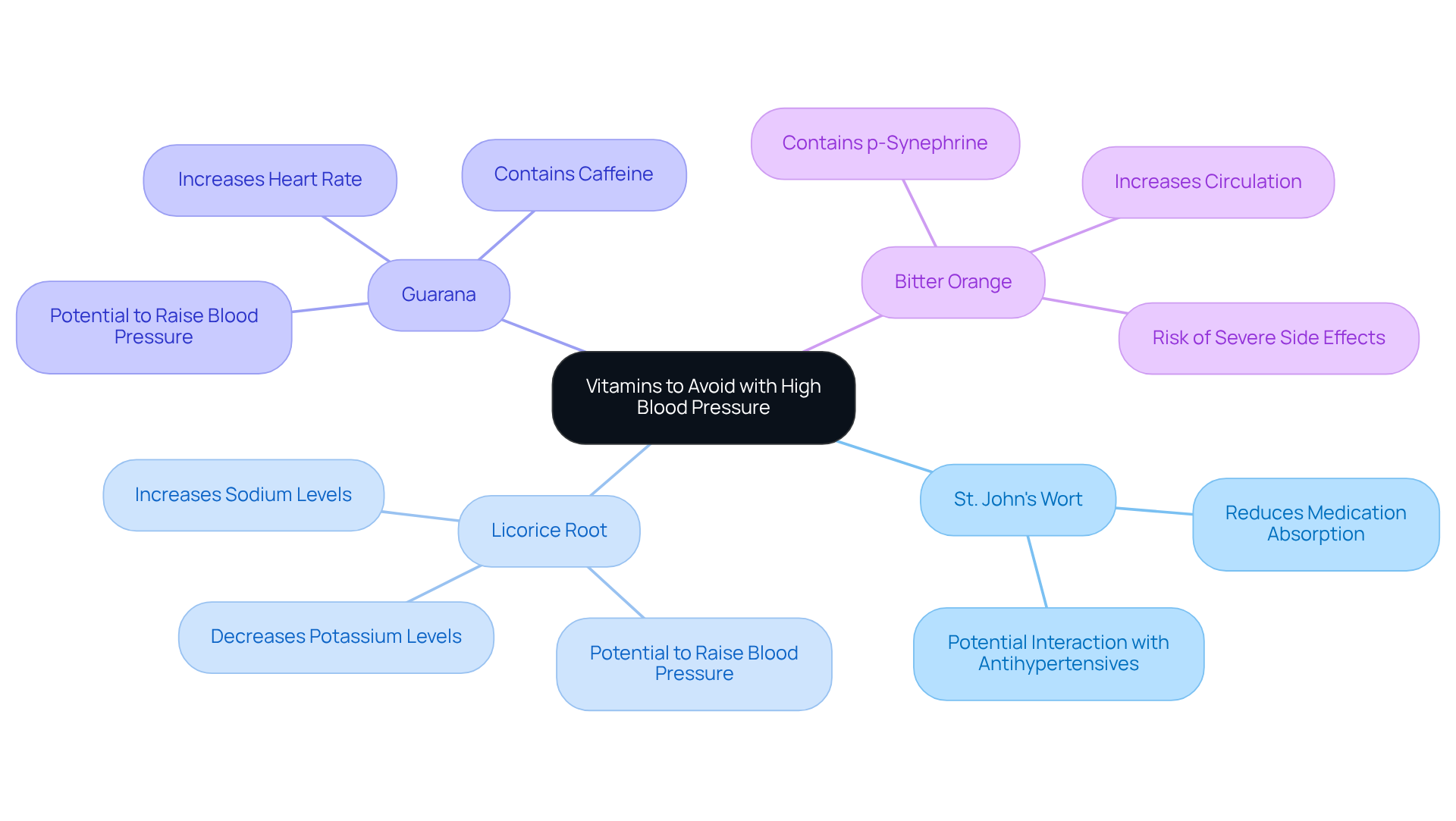
Vitamin D plays a crucial role in maintaining bone health and supporting our immune system. However, it’s important to be aware that consuming too much can lead to hypercalcemia, a condition characterized by elevated calcium levels in the blood. This can increase vascular tension and lead to various heart-related issues. As caring cardiologists often remind us, it’s essential to monitor vitamins to avoid with high blood pressure, particularly vitamin D levels, especially for those managing hypertension.
The Mayo Clinic highlights that "Vitamin D toxicity usually is caused by taking large doses of vitamin D supplements." This serves as a gentle reminder of the importance of sticking to recommended dosages. Current guidelines suggest that individuals with elevated blood pressure should be aware of the vitamins to avoid with high blood pressure, while aiming to keep their serum vitamin D levels within a safe range, typically between 600 to 800 IU daily, to help mitigate risks.
If you are considering vitamin D supplementation, it’s wise to consult with your healthcare professional. They can help tailor your vitamin D intake to fit your unique health needs, particularly by advising on vitamins to avoid with high blood pressure if you are on medications for hypertension. Recent studies indicate that for every 25 nmol/L increase in serum vitamin D, there’s a corresponding 5% decrease in the likelihood of high blood pressure. This highlights the importance of balanced consumption.
Yet, it’s crucial to approach this with caution. High doses of vitamin D can exacerbate hypercalcemia, leading to further complications in managing circulation. Be mindful of symptoms of hypercalcemia, which might include:
Staying informed and aware can empower you to take charge of your health.

Licorice root, recognized for its glycyrrhizin content, can pose significant health risks, especially related to vitamins to avoid with high blood pressure. This compound has the potential to elevate vascular tension by promoting sodium retention and depleting potassium, which can strain the cardiovascular system. Research indicates that even small amounts of glycyrrhizin can increase circulatory levels, making it crucial for individuals to avoid licorice root in all forms, including teas and dietary supplements. For example, a study revealed that consuming more than 57 grams of black licorice daily for just two weeks can lead to serious cardiovascular issues, particularly in those over 40 with a history of heart disease.
Healthcare experts strongly advise against using licorice root, which is one of the vitamins to avoid with high blood pressure for managing hypertension. Dr. Khashayar Hematpour points out that glycyrrhizin can directly raise blood pressure, leading to symptoms such as headaches and fluid retention. The Food and Drug Administration has cautioned that even moderate consumption may result in serious complications. Additionally, the French Agency for Food, Environmental and Occupational Health & Safety (ANSES) reported that approximately 60% of adults consuming licorice exceed the toxicological benchmark, highlighting the importance of caution.
Given these findings, it is wise for individuals managing hypertension to consult their healthcare providers about vitamins to avoid with high blood pressure before considering any supplements that contain licorice root. Thankfully, there are alternatives available, such as:
These can provide herbal relief without the risks associated with glycyrrhizin. Staying informed about the potential dangers of licorice root is essential for maintaining healthy circulation levels.
Your health and well-being are paramount, and understanding these risks can empower you to make informed choices.
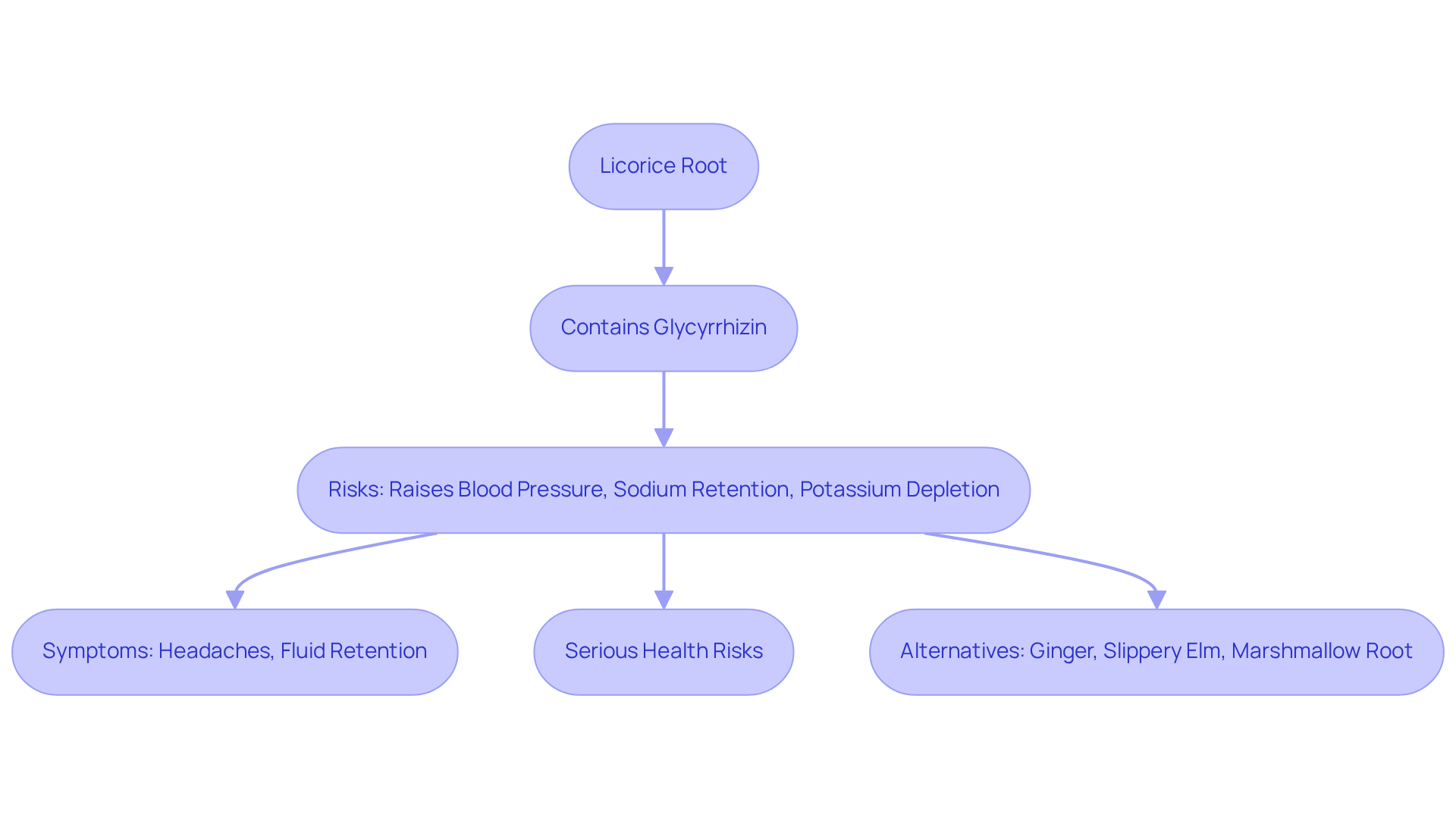
St. John's Wort is known for its antidepressant properties, but it's important to recognize that it can significantly impact many medications, particularly those prescribed for hypertension. This herbal supplement may reduce the effectiveness of these medications, potentially leading to uncontrolled hypertension. As caring pharmacists, we urge individuals using St. John's Wort to be especially vigilant, as it can result in harmful interactions with hypertension therapies, increasing the risk of complications.
Recent studies have shown that St. John's Wort interacts with a total of 646 drugs, including 288 major interactions. This highlights the importance of consulting a healthcare provider before adding any new supplements to your routine. For example, patients taking blood pressure medications who also use St. John's Wort may find their blood pressure levels rising, which reinforces the need for open communication with their healthcare team.
As pharmacist Ethan Melillo wisely states, St. John's Wort is "the worst supplement to take if you are on other medications." Real-life examples illustrate the importance of managing high blood pressure effectively while being aware of potential interactions. This emphasizes the necessity for careful monitoring and adjustments by healthcare providers.
Additionally, it's crucial for patients to be aware of the known alcohol and food interactions associated with St. John's Wort, as these could further complicate their treatment plans. Remember, your health is a priority, and taking proactive steps to discuss any concerns with your healthcare provider can lead to a safer and more effective treatment journey.

Arnica is well-known for its anti-inflammatory and pain-relieving properties, often used in topical applications for bruising and muscle soreness. However, it’s important to consider the potential dangers that vitamins to avoid with high blood pressure pose for individuals with hypertension. Have you ever wondered how something so common could affect your health? Studies indicate that arnica can elevate circulation levels, particularly when taken orally or applied to damaged skin, leading to possible health concerns. In fact, a study revealed that 13% of arnica gel users experienced side effects, compared to 8% of Advil users. This highlights the need for caution, especially concerning vitamins to avoid with high blood pressure.
Pain management experts strongly advise individuals with hypertension to avoid arnica products, as well as certain vitamins to avoid with high blood pressure, to minimize the risk of hypertensive episodes. Consulting with a healthcare professional is essential in identifying safer alternatives that won’t jeopardize your circulation. As the Mayo Clinic staff emphasizes, discussing safe pain management options with healthcare professionals is crucial for your well-being.
Recent studies further underscore the importance of being cautious, as the FDA classifies arnica as an unsafe herb when taken internally. Potential side effects can include increased bleeding, vomiting, and even organ damage. It’s vital to prioritize your cardiovascular health while seeking effective pain relief. Remember, you are not alone in this journey; reaching out for support can lead to safer and more effective solutions.
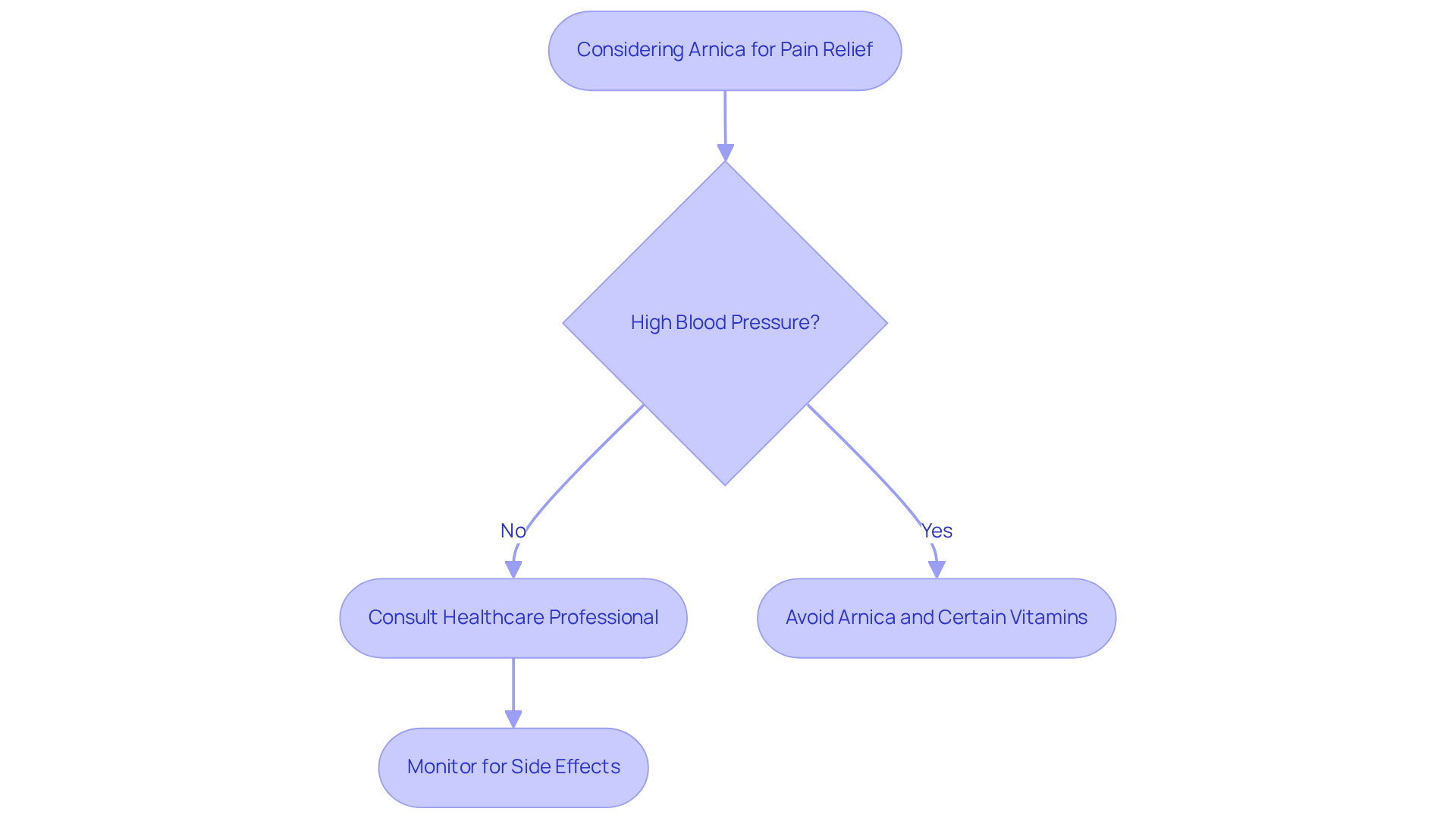
Bitter orange (Citrus aurantium) is often found in weight loss supplements, but it’s important to be aware of the potential dangers, especially for those with elevated vascular levels. If you have diabetes, high blood pressure, or a family history of heart conditions, it is essential to be cautious about vitamins to avoid with high blood pressure. The active compound synephrine can stimulate your cardiovascular system, which may lead to an increased heart rate and elevated blood pressure.
Research indicates that prolonged use of bitter orange can raise systolic blood pressure by approximately 6 mm Hg and diastolic pressure by about 4 mm Hg. This makes it a concerning choice for individuals managing hypertension, especially regarding vitamins to avoid with high blood pressure. Experts strongly recommend that individuals with high blood pressure avoid certain vitamins to avoid with high blood pressure, including bitter orange. One pharmacist notably states, "Due to these hazards and unclear advantages, bitter orange is not advised." This caution is echoed in many studies that highlight the negative cardiovascular effects associated with bitter orange, including potential heart rhythm issues and an increased risk of stroke.
Consider the experiences of those who have chosen safer alternatives for weight management. Many report better regulation of their blood pressure levels after making this switch. Ongoing studies continue to explore the effects of synephrine, revealing its potential to exacerbate heart rate and blood pressure issues, particularly in those who are already at risk.
Given these findings, it’s crucial for anyone with high blood pressure to consult healthcare providers regarding vitamins to avoid with high blood pressure before considering supplements containing bitter orange. At Amavita Heart and Vascular Health, Dr. Pedro Martinez-Clark and his team provide advanced imaging and comprehensive evaluations, ensuring that safer weight management options are available that prioritize your cardiovascular health. Remember, you are not alone in this journey—support is here for you.
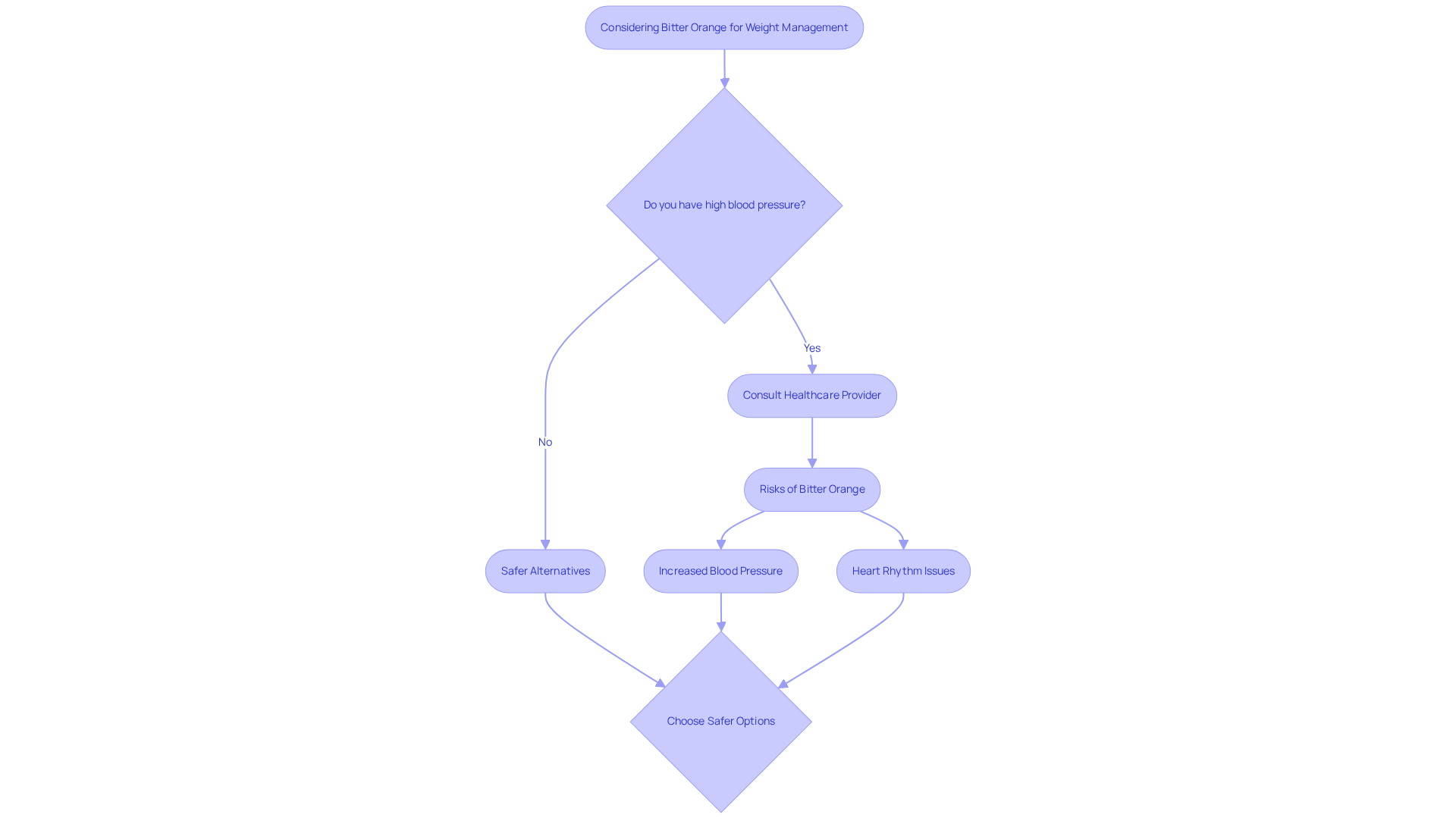
Guarana, a natural source of caffeine commonly found in energy drinks and dietary supplements, is among the vitamins to avoid with high blood pressure due to the significant risks it can pose. It’s important to be aware that large amounts of caffeine can lead to increased heart rate and circulation levels, which can be particularly dangerous for individuals with hypertension. Cardiologists emphasize the necessity of avoiding guarana and similar caffeine sources, along with certain vitamins to avoid with high blood pressure, to help maintain stable blood pressure levels.
Have you ever considered how energy drinks might affect your health? Recent studies reveal that these beverages, often containing guarana, contribute to over 20,000 emergency room visits each year in the U.S. This statistic highlights the potential health risks associated with their consumption. If you have elevated blood pressure, it is essential to avoid guarana, other stimulants, and vitamins to avoid with high blood pressure for effective management and overall heart health.
Remember, prioritizing your health is a journey, and you are not alone in this. Seeking support and making informed choices can lead to a healthier lifestyle. If you have concerns about your caffeine intake, please don’t hesitate to reach out for guidance. Your well-being is important, and there are caring professionals ready to help you navigate these challenges.
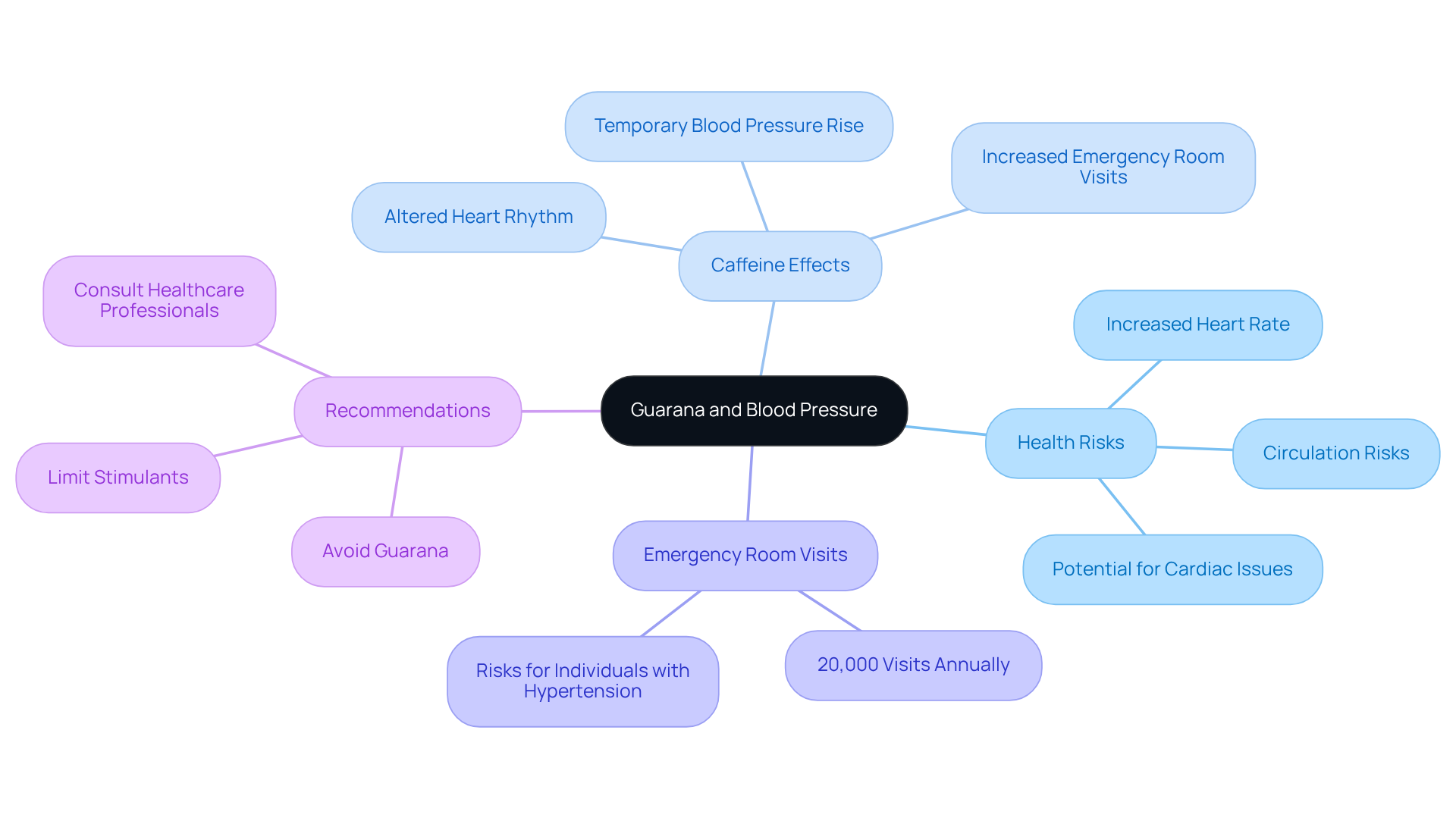
Asian ginseng (Panax ginseng) is often sought after for its potential energy-boosting effects. However, it’s important to be aware that its use can lead to significant variations in circulatory force, which may worsen elevated arterial tension and include vitamins to avoid with high blood pressure. Research suggests that while ginseng may provide some health benefits, it is not advisable for individuals with high blood pressure and certain vitamins to avoid with high blood pressure due to its potential to elevate blood pressure levels. It is always best for patients to consult with their healthcare providers before adding any herbal supplements to their routine, especially those managing high blood pressure.
Real-life experiences highlight the importance of knowing the vitamins to avoid with high blood pressure, such as ginseng. For instance, individuals who have faced adverse effects from ginseng, such as increased circulation and heart rate, have been advised to stop using it. Furthermore, the risks associated with herbal supplements extend beyond ginseng; many of these supplements may include vitamins to avoid with high blood pressure, which can negatively impact prescribed medications and complicate blood pressure management even further.
Current research emphasizes the need for caution. Studies indicate that ginseng is one of the vitamins to avoid with high blood pressure, as it can interfere with blood pressure medications and may result in unwanted side effects, including rapid heartbeat and elevated blood pressure. Therefore, individuals managing high blood pressure should prioritize their safety by discussing any herbal supplement use with their healthcare team, ensuring that it aligns with their treatment plan. Remember, your health and well-being are paramount, and seeking guidance is a positive step towards maintaining them.
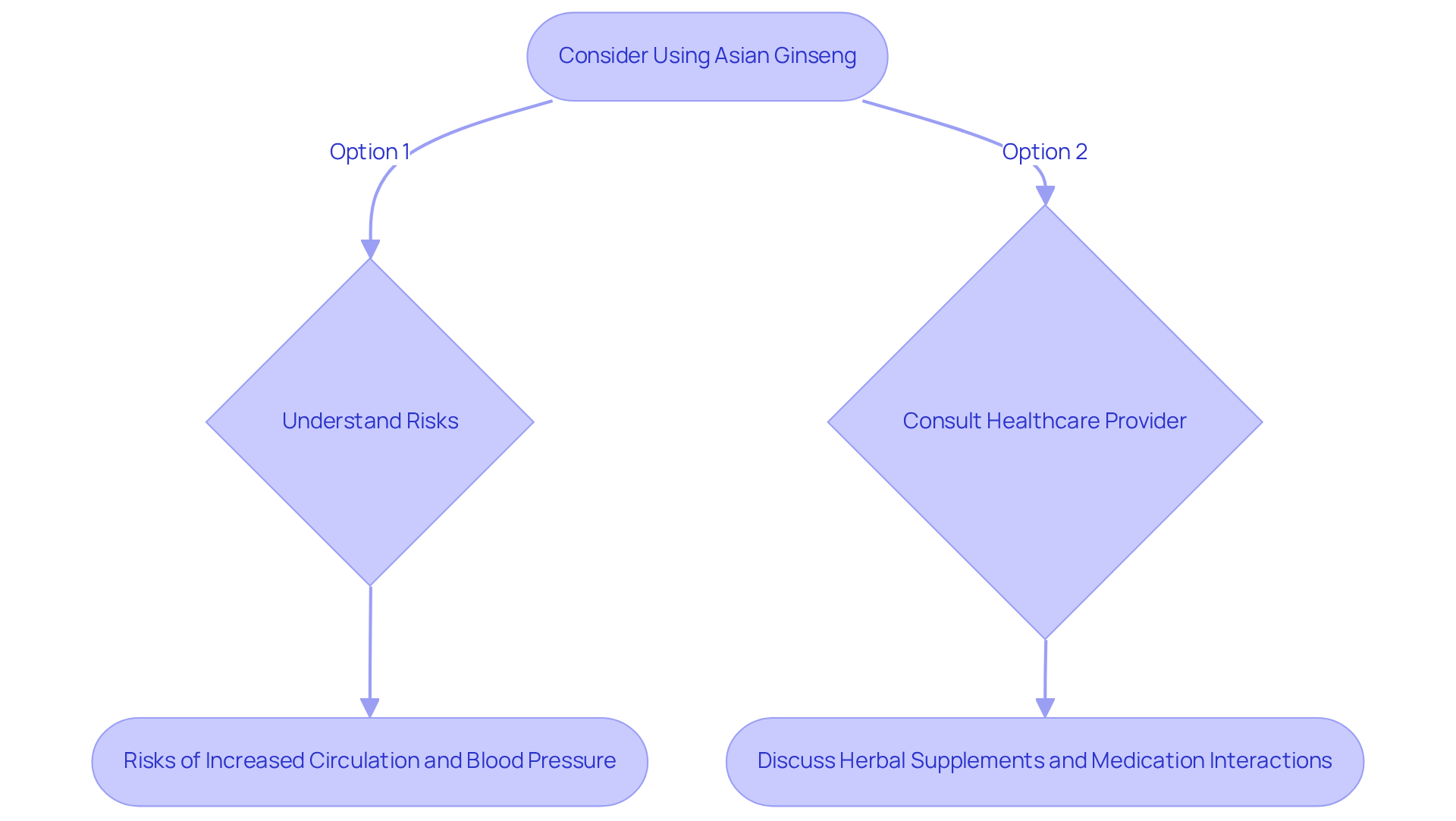
Yohimbe, an herbal supplement often marketed for weight loss and sexual health, may pose significant risks, particularly for individuals with hypertension, and it is important to consider vitamins to avoid with high blood pressure, especially for our elderly patients. The active ingredient, yohimbine, can elevate circulation levels and heart rate, which can be especially concerning for those managing high blood pressure and might need to consider vitamins to avoid with high blood pressure. Healthcare professionals, including those at Amavita Heart and Vascular Health, strongly advise against its use in this vulnerable population. For instance, yohimbe may reduce the effectiveness of medications like clonidine, which is used to control circulation levels, potentially leading to increased doses that require careful monitoring.
It is crucial for anyone considering supplements to consult with their healthcare providers, especially if they have cardiovascular concerns. Alissa Palladino, a licensed dietitian, emphasizes that individuals with a history of heart disease or hypertension should completely avoid yohimbe, as it is among the vitamins to avoid with high blood pressure because it can exacerbate these conditions.
Current research underscores the lack of reliable evidence supporting the safety and efficacy of yohimbe. Many products may contain inaccurate labeling and potentially harmful concentrations of yohimbine. A recent study examining various yohimbe supplements revealed that 39% contained pharmaceutical-grade extracts, raising concerns about their potency and safety.
Real-life experiences further illustrate the dangers: individuals who have taken yohimbe have reported negative effects such as increased anxiety and rapid heart rates, emphasizing the importance of knowing the vitamins to avoid with high blood pressure. Given these factors, it is vital for individuals with elevated arterial levels, particularly older patients, to avoid certain vitamins to avoid with high blood pressure, such as yohimbe, and instead focus on safer, evidence-supported methods for managing their health. We encourage you to seek guidance from specialized care providers like those at Amavita, who offer advanced imaging capabilities and thorough assessments tailored to your specific health needs. Remember, your health is our priority, and we are here to support you every step of the way.
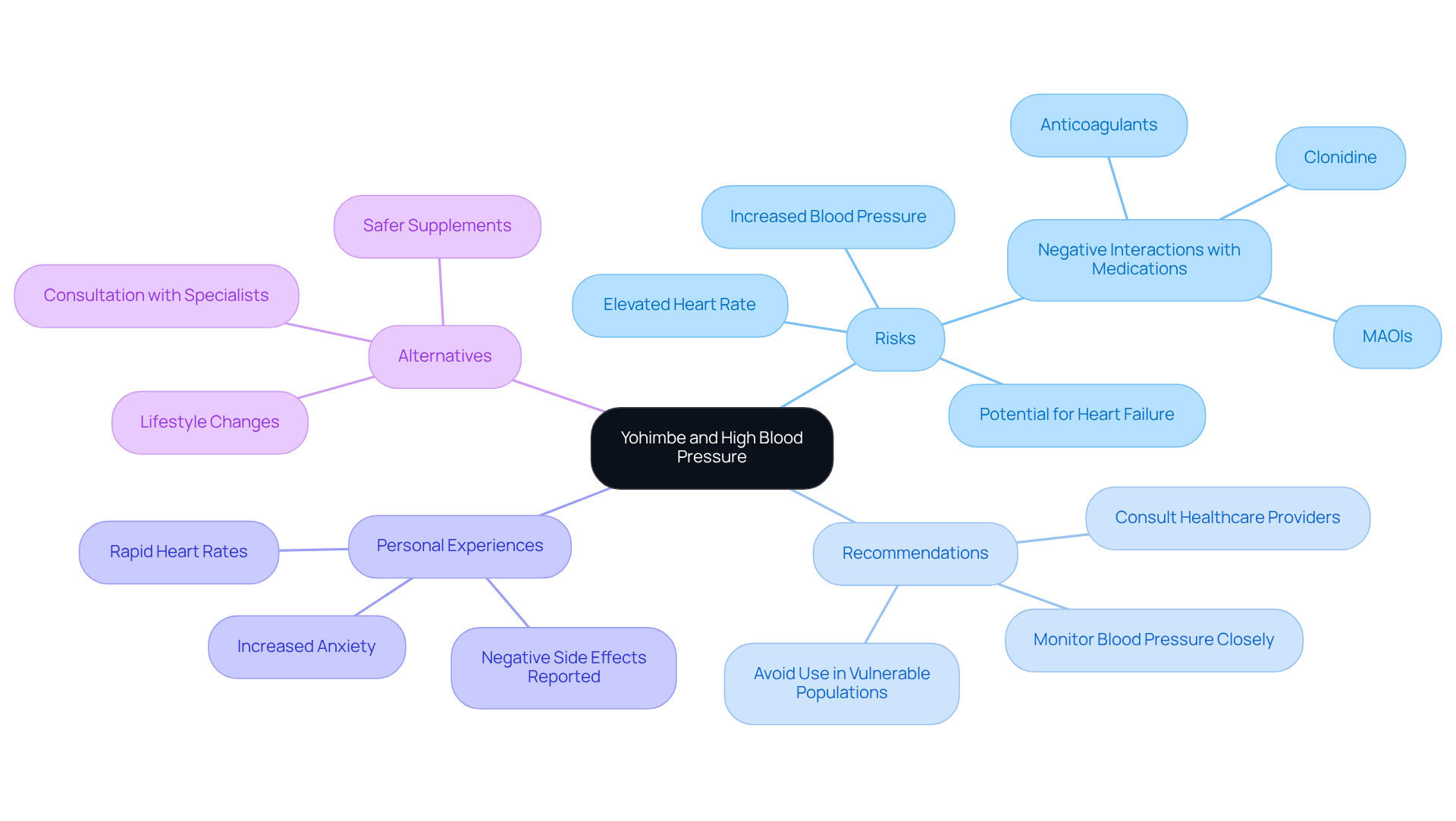
Ephedra is a powerful stimulant that poses significant risks to cardiovascular health, particularly for those living with hypertension. The FDA has linked ephedra to 80 deaths, highlighting its connection to serious cardiovascular events such as heart attacks and strokes. For individuals managing high blood pressure, it is crucial to be aware of vitamins to avoid with high blood pressure, as the stimulant effects of ephedra can lead to concerning increases in both blood pressure and heart rate, making it a perilous choice. Health experts, including cardiologists, strongly advise against using ephedra in any form.
Dr. Sheila Marie, a PharmD, emphasizes the importance of consulting healthcare providers for safer alternatives, especially considering the potential interactions of ephedra with other medications. At Amavita Heart and Vascular Health®, we advocate for thorough cardiac evaluations and preventive strategies, including advanced risk assessment tools and personalized interventions, to significantly lower heart attack risk.
Real-life situations, such as the tragic passing of Baltimore Oriole pitching prospect Steve Bechler, underscore the need for vigilance. Patients who have avoided ephedra often report better control over their high blood pressure and improved overall health. Current research continually reinforces the dangers of ephedra, in line with the consensus among cardiologists that there are vitamins to avoid with high blood pressure, as stimulants can worsen hypertension and lead to life-threatening complications.
For those with cardiovascular concerns, it is vital to steer clear of ephedra and be aware of the vitamins to avoid with high blood pressure to maintain health and safety. Always consult with a healthcare provider before taking any supplements, and consider developing a personalized cardiac care plan that addresses your unique condition and lifestyle. Remember, you are not alone in this journey; support is available, and taking proactive steps can lead to a healthier future.
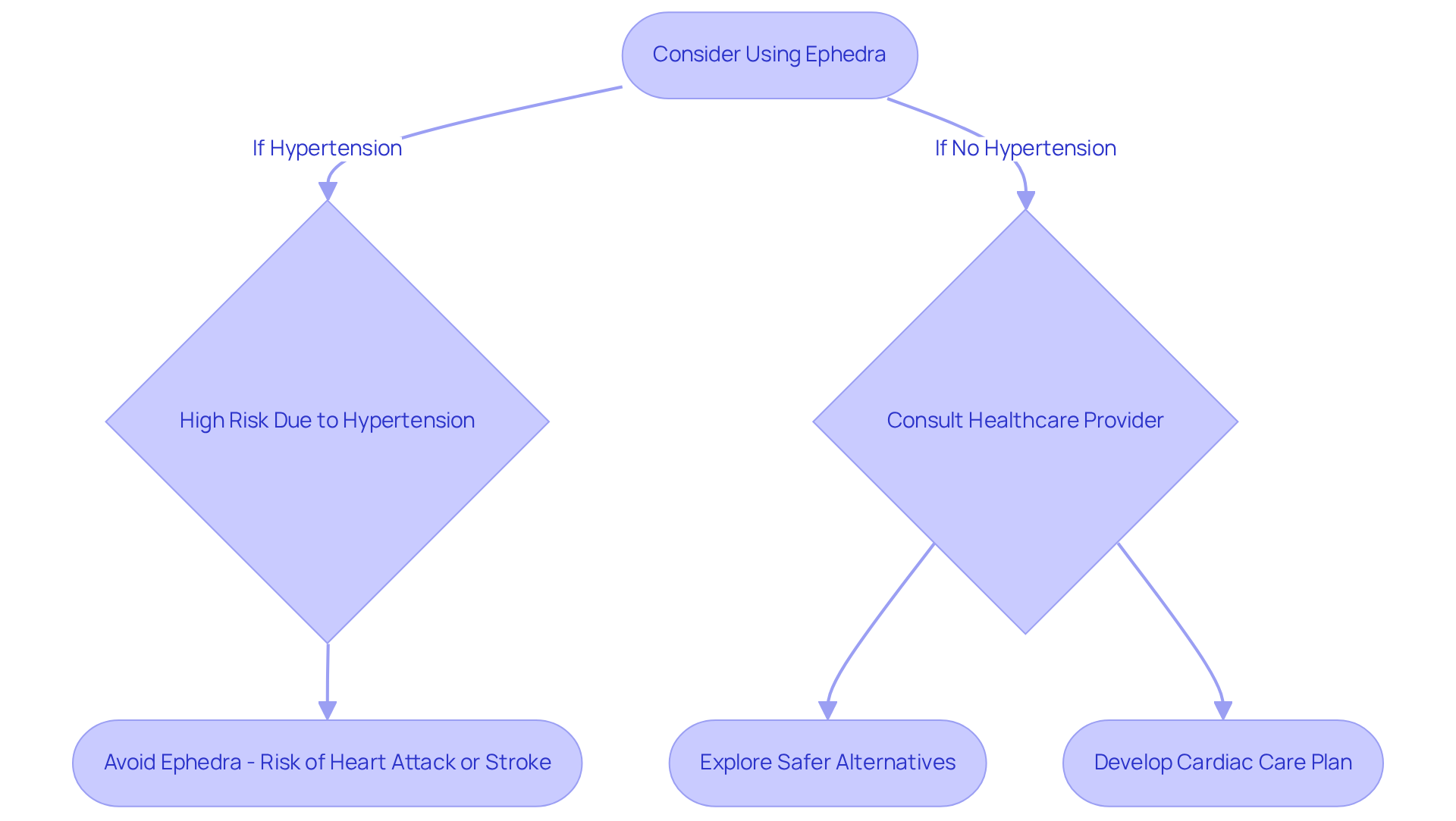
Understanding which vitamins to avoid with high blood pressure is vital for maintaining your cardiovascular health. It's important to recognize the significant impact that certain vitamins and herbal supplements can have on managing your blood pressure. By being aware of which substances may elevate circulation levels or interfere with your antihypertensive medications, you can make informed choices that truly support your well-being.
Consider the risks associated with supplements like:
These can exacerbate hypertension or hinder the effectiveness of your medications. Furthermore, be cautious with high doses of vitamin D and the stimulant effects of bitter orange and ephedra. It's essential to consult your healthcare provider before introducing any new supplements into your routine.
Ultimately, prioritizing your health and making educated decisions about vitamin intake can lead to better management of hypertension. Engaging with healthcare professionals and staying informed about the implications of various supplements is crucial for ensuring your cardiovascular safety. Taking proactive steps today can pave the way for a healthier future, empowering you to navigate your health journey with confidence.
What vitamins should be avoided with high blood pressure?
Vitamins to avoid with high blood pressure include St. John's wort, licorice root, guarana, and bitter orange, as they can elevate circulation levels or disrupt antihypertensive medications.
How does St. John's wort affect high blood pressure medications?
St. John's wort may reduce the effectiveness of hypertension medications by hindering their absorption.
Why is licorice root considered harmful for those with high blood pressure?
Licorice root can lead to elevated sodium levels and decreased potassium levels, which may increase vascular tension and strain the cardiovascular system.
What are the risks associated with guarana for individuals with high blood pressure?
Guarana contains caffeine that may increase circulation levels and heart rate, particularly when consumed in large quantities.
What is the concern with bitter orange for those managing hypertension?
Bitter orange contains p-Synephrine, a stimulant that can elevate circulation and heart rate, posing a risk of severe side effects.
What does research say about vitamin E and blood pressure?
A systematic review indicated that vitamin E was effective in decreasing systolic levels by a mean difference of -14.14 mm Hg compared to placebo.
Are there any concerns with vitamin D for individuals with high blood pressure?
High doses of vitamin D may interact with diuretics, potentially leading to elevated calcium levels and increased vascular tension, which is why it should be approached with caution.
What is the recommended daily intake of vitamin D for those with elevated blood pressure?
Current guidelines suggest keeping serum vitamin D levels within a safe range of 600 to 800 IU daily.
What symptoms might indicate hypercalcemia due to high vitamin D intake?
Symptoms of hypercalcemia can include an upset stomach, vomiting, weakness, and frequent urination.
Why is licorice root particularly dangerous for those over 40 with a history of heart disease?
Consuming more than 57 grams of black licorice daily for just two weeks can lead to serious cardiovascular issues in this demographic due to its glycyrrhizin content.
What alternatives can individuals consider instead of licorice root?
Alternatives include ginger, slippery elm, and marshmallow root, which can provide herbal relief without the associated risks of glycyrrhizin.
What should individuals do before starting any new vitamin or supplement routine?
It is important for individuals, especially those with elevated blood pressure, to consult their healthcare providers before starting any new vitamin or supplement routine.